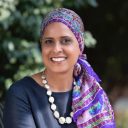Every philanthropist has a personal motivation as to why they give. For me, and most of my family, our ‘why’ is based upon our Muslim faith. We give because it is rooted in our faith and family traditions. My family, like many others, is an immigrant family. Growing up in a working-class household, we would sit at the kitchen table and discuss how our family could give back. While we weren’t extravagant, we knew we had power to make a difference in others’ lives.
As a country, America’s faith-based philanthropy is a vital element of our social safety net. There are critical intersections with the secular and governmental sectors in providing basic services from healthcare to housing and education. Although each philanthropist may have a different ‘why’ or ‘who,’ the ‘what’ and ‘how’ often have significant intersection. This intersectionality is where we get the fuel for the fire of community collaboration.
Data shows that religious communities serve as a trusted source for delivery of services. When individuals that are part of a faith community are in need, that community will often function as their first point of entry to request assistance. Donors also feel comfortable entrusting funds to their religious organizations to properly steward their resources in the care of the most vulnerable members of their community. And yet, religious nonprofits face a number of challenges in the philanthropic sector. Often, historically marginalized religious communities have to operate from a scarcity mindset, feeling as though they’re siloed, segmented and competing for those dollars.
In 2017, my family and I wanted to understand and address this scarcity mindset, particularly as it related to the Muslim nonprofit space. Together with the Indiana University Lilly Family School of Philanthropy, we created the Community Collaboration Initiative, a three-year long process that supports collaboration, learning and honest conversations between philanthropy and Muslim-led institutions to explore the various aspects and intersection of faith and philanthropy. We brought together 22 Muslim led nonprofits that are creating a better America in their respective fields, whether that’s community organization, health and well-being or the legal sector. Throughout the three years, the nonprofits had three focuses: Trust, a Shared Project and Sustainability.
During this process, we underwent a Year of Learning and identified an additional barrier at play: the general philanthropic sector is not color blind, but color discriminatory. There’s a limited – and often misguided – understanding of the initiatives and racial diversity of the Muslim American community. Combined with (and at times stemming from) internalized Islamophobia, it means that philanthropists often overlook or reject Muslim nonprofits and create a cycle of separation.
Now, as we get ready to announce the Muslim Collaboration Prizes, a $1.5 million fund to close out the Community Collaboration Initiative, we reflect on how funding is distributed in our nonprofits, and how a new perspective on faith-based philanthropy can fuel broad community collaboration in the future.
In conversations with philanthropists, we found that most philanthropic leaders knew very little about Islam and the work most Muslim-led nonprofits are doing. But once philanthropic leaders were in the same room as leaders from Muslim-led nonprofits and had meaningful conversations, they expressed the desire to learn more about the organizations and engage in further dialogue.
This further dialogue is essential – not just for the individual impact capacity of a singular Muslim nonprofit, but for the larger, atmospheric transformation that nonprofits are able to experience alongside one another. By increasing access to and understanding of donors, Muslim nonprofits are able to shift from a scarcity mindset to one of shared wealth and abundance. They’re able to build trust and relationships with each other and construct a network that’s able to more holistically and expertly service community members with multiple needs.
We look forward to bringing our learning and our faith-based philanthropy to a larger community collaboration, regardless of their philanthropic why, that fuels an America that is more equitable for all. The work certainly isn’t done, but sustainable change can – and will – happen if we all look towards this future.
Dilnaz Waraich is a philanthropist, community organizer, educator, and interfaith activist with more than three decades of experience in relationship building, cultural sensitivity facilitation, spiritual engagement activities and civic empowerment.






Comments (0)